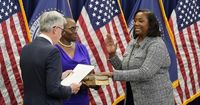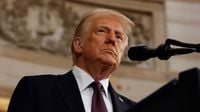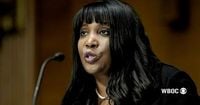On August 29, 2025, a legal showdown unfolded in a Washington, D.C. federal courtroom that could reshape the future of America’s central bank. Lisa Cook, the first Black woman to serve on the Federal Reserve’s Board of Governors, is fighting to keep her seat after President Donald Trump moved to fire her earlier this week. The dramatic hearing, which lasted more than two hours, ended with no immediate ruling from Judge Jia Cobb, leaving Cook’s fate—and the independence of the Federal Reserve—in limbo.
At the heart of the dispute are allegations of mortgage fraud, leveled against Cook by Bill Pulte, director of the Federal Housing Finance Agency and a Trump appointee. Pulte claims Cook misrepresented her properties to the government by declaring two primary residences in order to secure more favorable mortgage rates. According to Bloomberg News, Pulte stated that he had made a "second criminal referral" to the Justice Department, alleging Cook made false statements about her mortgages during her time as a Fed governor. Yet, as multiple outlets including NewsNation and BBC have reported, Cook has not been charged with any crime, and her legal team insists the accusations are politically motivated.
Cook’s attorneys, led by Abbe Lowell and Norman Eisen, argued that the allegations are a "smear campaign" designed to discredit her and open a board seat for Trump to fill. In court, Lowell described the administration’s actions as their “weapon of choice” after similar attempts to target Fed Chair Jerome Powell over unrelated matters. "Nothing in these vague, unsubstantiated allegations has any relevance to Gov. Cook’s role at the Federal Reserve, and they in no way justify her removal from the Board," Cook’s lawyers said in a statement quoted by NBC News. They further pointed out that Cook learned of her removal from social media posts, not through any official communication, which they argue violates her right to proper legal notice.
President Trump’s team, meanwhile, maintains that the decision to fire Cook rests squarely within his presidential powers. Justice Department attorney Yaakov Roth asserted in court, “Congress does not have the authority to restrict the removal of a federal officer.” The White House, through press secretary Karoline Leavitt, added that “you have these mortgage receipts very clearly shown to the president, and he has the cause that he needs to fire this individual.” Trump’s official termination letter to Cook, as reported by The Guardian, cited the mortgage fraud allegations and declared her removal effective immediately.
Judge Cobb, who presided over the hearing, appeared deeply aware of the stakes. At the outset, she remarked, “This case obviously raises important questions” regarding the Federal Reserve Board, and she noted the Fed’s unique status among government agencies. Cobb expressed discomfort with Trump’s public statement during a Cabinet meeting: “We’ll have a majority very shortly. So that’ll be great.” This comment, reported by Bloomberg and The Guardian, fueled concerns that Cook’s removal is less about alleged misconduct and more about shifting the board’s balance in Trump’s favor.
Indeed, the broader context is hard to ignore. The Federal Reserve, responsible for setting the nation’s interest rates and controlling inflation, has historically prized its independence from political pressure. Trump has spent months publicly criticizing the Fed for not cutting interest rates as aggressively as he desires, despite the economy not meeting the central bank’s 2% inflation target. Fed Chair Jerome Powell has resisted these calls, citing economic uncertainty created by Trump’s sweeping tariffs and other policies. According to NewsNation, Powell has argued that “the president’s tariffs and immigration crackdown have disrupted the global economy and knocked the US labor force.”
Should Cook’s removal stand, it would create the second vacancy on the seven-member Fed board in less than a month, allowing Trump to further reshape the institution. JPMorgan chief U.S. economist Michael Feroli told Bloomberg, “If the president were successful, the outcome would be momentous.” Trump’s nominees, if confirmed, could soon influence the powerful Federal Open Market Committee (FOMC), which sets national interest rates. Notably, two Trump-appointed governors, Michelle Bowman and Christopher Waller, abstained from a 2023 vote to approve Chicago Fed President Austan Goolsbee, a move seen as a signal of the administration’s intent to assert greater control over the committee.
Cook’s lawsuit seeks not just to block her firing, but to secure a court declaration that unsubstantiated allegations from before her Senate confirmation do not constitute “cause” for removal. Under the law that established the Federal Reserve, a governor can only be removed “for cause”—a standard generally interpreted as requiring clear wrongdoing. Her lawyers argue that the administration’s reliance on words like “may” and “potentially” in the termination letter falls far short of this bar. “If all we have is a tweet, and it says ‘might’, ‘maybe’, ‘could’, ‘possibly’, ‘potentially’—and there’s no notice, there’s no opportunity [to be heard], it’s all based on this litigation by tweet,” Lowell said in court, as reported by The Guardian.
The legal arguments have now been laid out, with both sides expected to submit additional filings by early September. Judge Cobb indicated she hopes to issue a decision within two weeks, but the case is widely expected to end up before the U.S. Supreme Court. Legal scholars and market watchers alike are closely monitoring the proceedings, given their potential to set a precedent for the political independence of the Fed. As BBC noted, past Supreme Court opinions have suggested the central bank might be among the rare agencies shielded from direct presidential removal, though the issue has never been definitively settled.
Meanwhile, the Federal Reserve itself has taken a cautious stance, declining to offer arguments in the case but urging the court to deliver a “prompt ruling” to remove the cloud of uncertainty hanging over the institution. The stakes are high—not just for Lisa Cook’s career, but for the future of the Fed’s ability to operate free from political interference. With the judge’s ruling still pending, the financial world is left to wonder: will America’s central bank remain an independent guardian of the economy, or is a new era of political influence about to begin?
As the legal battle continues, Cook’s job status remains uncertain, but the broader fight over the Fed’s independence has never felt more urgent—or more consequential.



